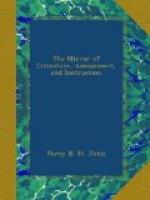“Grace!” exclaimed her father joyfully, “here is the child Abel—he is found!” and seizing the trembling boy, with evident exultation, led him to her. The effect of this act of the poor simple-minded man was electrical. The mother instantly revived, but turned her face from her husband; and, entwining her son in her arms, pressed him closely to her side. The clergyman proceeded to interrogate the prisoner, but he answered nothing, keeping his eyes intently fixed upon his wife and child. In the mean time, the officers of justice had been prompt in the execution of their duty; the Smiths were apprehended in the village, and the greater portion of the property stolen from Sir Thomas Purcel was found in the hut where Grace had beheld it concealed.
When the preparations were sufficiently forward to conduct the unfortunate men to prison, Joseph Huntley advanced to his wife. The scornful as well as undaunted expression of his countenance had changed to one of painful intensity; he took her hand within his, and pressed it to his lips, without articulating a single syllable. Slowly she moved her face, so that their eyes encountered in one long mournful look. Ten years of continued suffering could not have exacted a heavier tribute from Grace Huntley’s beauty. No language can express the withering effects of the few hours’ agony. Her husband saw it.
“’Twas to save my children!” was the only sentence she uttered, or rather murmured; and it was the last coherent one she spoke for many weeks. Her fine reason seemed overwhelmed. It was a sight few could witness without tears. The old father, tending the couch of his afflicted daughter, would sit for hours by her bedside, clasping the child Abel’s hand within his, and every now and then shaking his head when her ravings were loud or violent.
[We add the conclusion.]
It might be some fifteen years after these distressing events had agitated the little village of Craythorpe, that an elderly woman, of mild and cheerful aspect, sat calmly reading a large volume she supported against the railing of a noble vessel, that was steering its course from the shores of “merrie England” to some land far over the sea. Two gentlemen, who were lounging on the quarter-deck arm-in-arm, frequently passed her. The elder one, in a peculiarly kind tone of voice, said, “You bear the voyage well, dame.”—“Thank God! yes, sir.”—“Ah! you will wish yourself back in Old England before you are landed six weeks.”—“I did not wish to leave it, sir; but my duty obliged me to do so.”
The gentlemen walked on.
“Who is she?” inquired the younger.
“A very singular woman. Her information transported for life a husband whom she loved, notwithstanding his coldness and his crimes. She had at that time three children, and the eldest had already become contaminated by his father’s example. She saw nothing but destruction for them in prospective, her warnings and intreaties being alike unregarded. So she made her election—sacrificed the husband and saved the children!”




